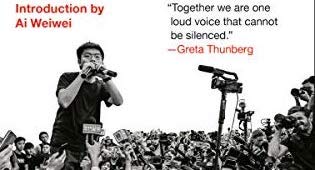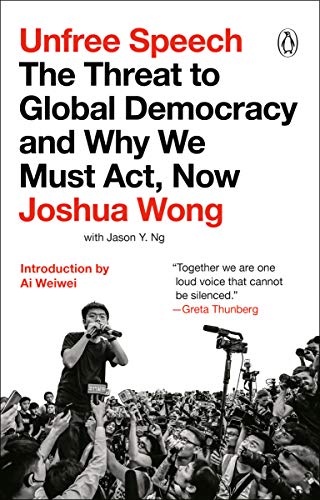
Unfree Speech: The Threat to Global Democracy and Why We Must Act, Now by Joshua Wong – Reviewed by Alex Watson
Unfree Speech: The Threat to Global Democracy and Why We Must Act, Now by Joshua Wong with Jason Ng, Ai Weiwei (Intro.) and Chris Patten (Foreword) London: W. H. Allen, 2020, 268 pp., $11.07 (paper).

Joshua Wong is the Hong Kong pro-democracy activist who became famous in 2011, aged just twelve, when he organized a successful protest against the city government’s attempts to install a new “Moral and National Education” school curriculum more sympathetic to the People’s Republic of China. He subsequently became the secretary-general of Demosistō, an organization seeking greater political autonomy for Hong Kong. He was also a leading figure in the 79-day 2014 “Umbrella Movement” sit-ins, which protested against the Chinese government’s efforts to start screening candidates for the position of Hong Kong’s chief executive.
Wong divides Unfree Speech into three sections (or “acts”). First, he relates his heady early experiences, as he and his secondary-school friend Ivan’s protest snowballed into a potent political force encompassing over a hundred thousand citizens. He also describes the “paradigm shift” that occurred with the “Umbrella Movement”—as a city regarded formerly as business-minded and apolitical erupted in dissent. The second and longest section is based on diaries and letters Wong wrote while in Pik Uk Prison prison in 2017, after being jailed for unlawful assembly. In the third part, Wong reflects on the significance of the 2019 protests that followed the government’s attempts to enable accused Hong Kong citizens to be handed over to the Chinese mainland for trial.
Wong describes how the “one country, two systems” agreement made between Britain and China during the Handover negotiations established a constitution which is only in part democratic. The highest office, the position of chief executive (currently held by Carrie Lam) is selected not by an electorate but by “a small committee stacked with Communist Party loyalists, business tycoons and special interest groups.” In addition, the Legislative Council is chosen partly by voters and partly handpicked by a small circle of trade and interest groups. According to Wong, this “lop-sided electoral system” has created “an unaccountable government” that has enabled the Chinese government to consolidate its power over Hong Kong citizens. At the same time, Wong acknowledges that Hong Kong’s political instability stems also from economic inequality. Hong Kong, for example, is a city in which old people push heavy carts of recycled papers up hills past some of the most expensive properties in the world to sell them for a pittance.
As the Chinese artist Ai Weiwei notes in the Introduction, “Joshua Wong represents a new generation of rebel” who emerged after the fall of the Berlin Wall, in a globalized era of ubiquitous digital communication. Wong was born in 1996, one year before the handover of Hong Kong from the UK to China. Half world-famous activist, half ordinary schoolboy, Wong likens himself to Peter Parker: “Like Spiderman’s alter ego, I went to class during the day and rushed out to fight evil after school.” When describing his own political beliefs, Wong draws both on his devout Christian beliefs and pop cultural references to anime series, Harry Potter and V for Vendetta. At one point, he exclaims “If Carrie Lam resembled Darth Vader, then the Hong Kong Police Force would be the armor-clad, blaster-brandishing stormtroopers terrorizing villagers across the galaxy”. As he observes, he will be fifty years old in 2047, the year in which China’s agreement with the UK formally expires. He claims that this vantage-point has led his generation to reject the accommodating approach of their well-mannered, career-focused parents: “I want to be able to tell my children that their father once fought a good fight to safeguard their homeland. I will tell them that their father didn’t make the same mistake their grandparents’ generation did at the Handover, when they let other parties decide their own future.”
As his reference to the city as his “homeland” suggests, his beliefs are underscored by a nascent Hong Kong nationalism. He likens Hong Kong to “a foster child who was raised by a white family and, without his consent, returned to his Chinese biological parents.” He claims the city possesses a “fledgling identity,” comparing its struggle with Catalonians’ search for independence from Spain.
It is possible that a more detailed account of Wong’s fairly unique experience of early protest might have been more riveting than the large section of somewhat conventional prison diaries. Moreover, it is a shame that Wong has not updated the later section to describe his own participation in the 2019 protests against a government proposal to allow the extradition of criminal suspects to stand trial on the mainland. Nonetheless, Wong presents a powerful warning to readers about the risks of the growing power of China’s authoritarian government: “Our struggle has become your struggle, whether you like it or not.”
